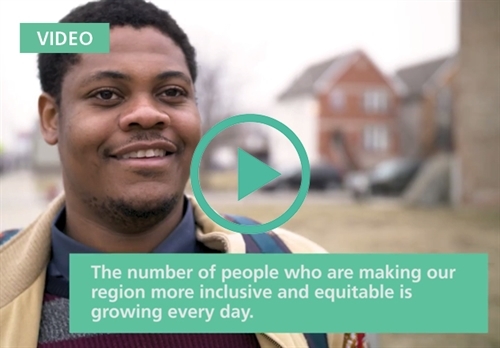
Northwest Side Housing Center's James Rudyk, Jr. and Dominica McBride empower residents to take a more active role in their communities.
This profile is part of a series that highlights the work of government, business and community leaders in creating a more equitable and inclusive Chicago region. Each of these stories is featured in "Our Equitable Future"—two dozen recommendations to advance equity MPC released in response to the 2017 Cost of Segregation findings.
Belmont Cragin is changing. The neighborhood on Chicago’s northwest side was once deeply Polish, but now is the fastest growing Latino community in the city of Chicago.
Neighborhoods change faster than policies, knows James Rudyk, Jr., Executive Director of the Northwest Side Housing Center (NWSHC), a local non-profit organization that has worked since 2003 to offer housing counseling, financial education, outreach, advocacy, supportive services, and—perhaps most importantly—community organizing.
“Residents are in the best position to create and lead change because they best understand their community,” says Rudyk. “The days of top-down community development are over. For us, it’s about coming from the grassroots, not the grasstops.”
For Rudyk and NWSHC, the lessons gleaned from community organizing inform a shifting suite of relevant programming, from first-time homebuyer classes, to foreclosure prevention counseling, to a Latina-centered financial education program. The NWSHC provides services in English, Polish, and—increasingly—in Spanish.
“It’s not acceptable to exclude 80% of the Belmont Cragin community that’s Latino,” Rudyk says. “We can no longer accept that.”
Dominica McBride, Founder and CEO of Become: Center for Community Engagement and Social Change, is working with NWSHC to build the organization’s long-term plan in a way that listens to needs, desires, and lived history of locals. McBride ensures that all voices are heard during the organizing process.
Both McBride and Rudyk see that unlocking local residents’ power through organizing offers a potent model for building equity across Chicagoland’s deeply divided neighborhoods.
“We can do this across the city,” McBride says. “We can get across and through that gap that segregation creates and start to be together.”
Explore more of the stories in this series.
Who's advancing equity in the Chicago region right now?
This 5-minute video highlights some government, community and business leaders who are already taking action to make our region more equitable and inclusive every day.

MPC thanks CIBC US for generously sponsoring this video.
